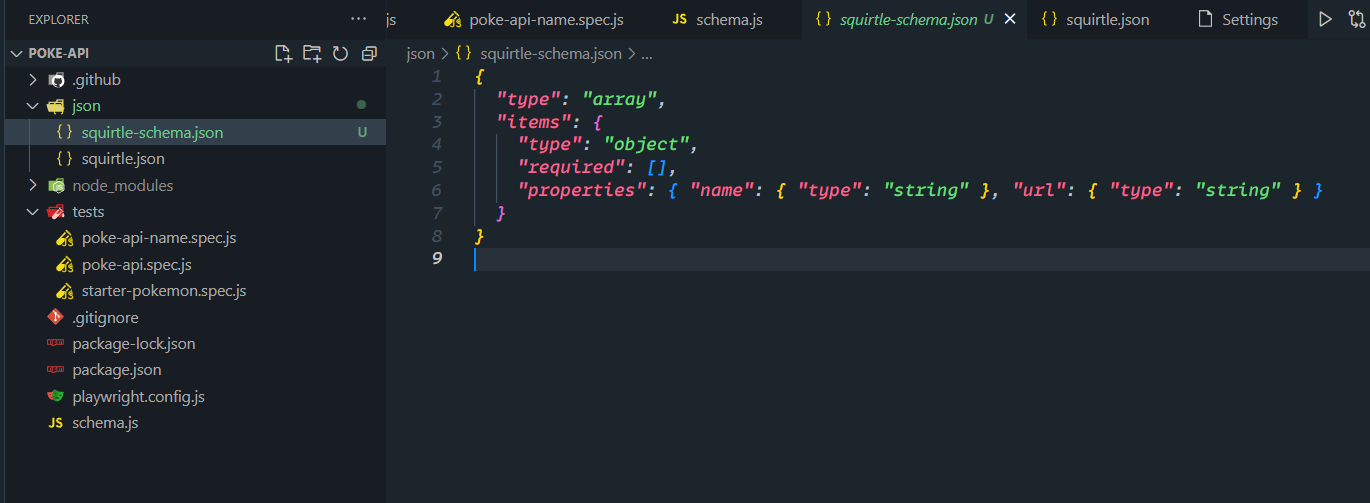Validating JSON Schema
We have a fun one here. Were going to switch up slightly from what we normally do, and were going to create a JSON schema for the poke-api.
JSON schemas can be a real pain to create by hand, so were going to import in a new package to help out.
npm i easy-json-schema
Creating a Schema with ejs
first things first, we need some JSON. for this example im going to keep it simple and go back to the forms that we used last time
const { test, expect } = require('@playwright/test');
test('Pokemon information', async ({ request }) => {
const pokemon = await request.get(`pokemon/squirtle`);
const pokejson = await pokemon.json()
const pokeForms = pokejson.forms
});After running the test code, we should see the following
[
{
name: 'squirtle',
url: 'https://pokeapi.co/api/v2/pokemon-form/7/'
}
]This is the base we will use for our schema. Lets create a new folder called json then add in our squirtle.json
TIP
Formatting the document should stringify your results.
After that is completed lets create a quick JavaScript file, and name it something simple like schema.js with the following code
//get the squirtle.json file
const file = require('./json/squirtle.json')
// import in the easy json schema dependency
const ejs = require('easy-json-schema');
// create the json schema from the squirtle file
const jsonSchema = ejs(file);
//print the results with stringify
console.log(JSON.stringify(jsonSchema));Its important that we make sure that the final results are strings, otherwise the next file will yell at us
Create another file under the json folder called squirtle-schema.json and paste in the results
Results can also be found here
{"type":"array","items":{"type":"object","required":[],"properties":{"name":{"type":"string"},"url":{"type":"string"}}}}
Creating a Schema Test
Now that we have the schema created, we can make a test out of it. Within our forms test lets add a few things.
const { test, expect } = require('@playwright/test');
// get the schema file
const file = require('../json/squirtle-schema.json')
// import in easy json schema
const ejs = require('easy-json-schema');
test('Pokemon information', async ({ request }) => {
const pokemon = await request.get(`pokemon/squirtle`);
const pokejson = await pokemon.json()
const pokeForms = pokejson.forms)
// transform the result to schema
const formSchema = ejs(pokeForms);
expect(file).toEqual(formSchema)
});After you run your test, you should see a success
Why this is cool
Going back to our main request, i want you to focus on this line
const { test, expect } = require('@playwright/test');
// get the schema file
const file = require('../json/squirtle-schema.json')
// import in easy json schema
const ejs = require('easy-json-schema');
test('Pokemon information', async ({ request }) => {
const pokemon = await request.get(`pokemon/squirtle`);
const pokejson = await pokemon.json()
const pokeForms = pokejson.forms)
// transform the result to schema
const formSchema = ejs(pokeForms);
expect(file).toEqual(formSchema)
});Instead of squirtle, add any other pokemon you can think of, or any ID that exists within the poke-api const pokemon = await request.get(pokemon/1) Test Succeeds const pokemon = await request.get(pokemon/mudkip) Test Succeeds const pokemon = await request.get(pokemon/234) Test Succeeds const pokemon = await request.get(pokemon/charmander) Test Succeeds
This is awesome. because even if the data is changing, we know that things are still working because the schema hasn't changed and we know that the front end and back-end are still similar and following the requirements that we expect.
Furthermore, We could even create a schema from our snapshot we already have if we wanted to.
 Documentation Biome
Documentation Biome